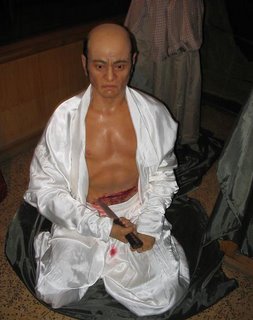 Yubitsume, or finger-cutting, is a form of penance or apology. If a gambler couldn't pay back a debt or something like that the persons tip of the little finger got cut off, which damage the hand and the person could not hold his sword as well as before. Also that way other people could see if a person haven't paid a debt, which could bring certain problems, since gambling always been prohibited in Japan.
Yubitsume, or finger-cutting, is a form of penance or apology. If a gambler couldn't pay back a debt or something like that the persons tip of the little finger got cut off, which damage the hand and the person could not hold his sword as well as before. Also that way other people could see if a person haven't paid a debt, which could bring certain problems, since gambling always been prohibited in Japan. Its origin stems from the traditional way of holding a Japanese sword. The bottom three fingers of each hand are used to grip the sword tightly, with the thumb and index fingers slightly loose. The removal of digits starting with the little finger moving up the hand to the index finger progressively weakens a persons sword grip. The idea is that a person with a weak sword grip then has to rely more on the group for protection — reducing individual action. In recent years, prosthetic fingertips have been developed to disguise this distinctive appearance.
This is done as an apology for disobedience. It can be done to expiate a wrongdoing but can also be done to spare one of your "children".
When you have done something that your Kumicho dislikes you take a sharp item,cut of a fingertip,wrap it in paper and send it to the Kumicho and begs for his forgiveness.If it's the first time you cut of the little- fingertip there after it becomes the next little-finger and so on.Because of that you see yakuza- members that are without several of his fingers.
 Another, more radical version of penance is seppuku (also known as hara-kiri ), ritual suicide by disembowelment. Popular among Japanese samurai and soldiers who would commit it as penance for their failures, Yakuza are sometimes known to commit seppuku as well.
Another, more radical version of penance is seppuku (also known as hara-kiri ), ritual suicide by disembowelment. Popular among Japanese samurai and soldiers who would commit it as penance for their failures, Yakuza are sometimes known to commit seppuku as well.Another prominent yakuza ritual is the sake-sharing ceremony. This is used to seal bonds of brotherhood between individual yakuza members, or between two yakuza groups. For example, in August 2005, the Godfathers Kenichi Shinoda and Kazuyoshi Kudo held a sake-sharing ceremony, sealing a new bond between their respective gangs, the Yamaguchi-gumi and the Kokusui-kai.
When yakuza members play Oicho-Kabu cards with each other, they often remove their shirts or open them up and drape them around their waists. This allows them to display their full-body tattoos to each other. This is one of the few times that yakuza members display their tattoos to others, as they normally keep them concealed in public with long-sleeved and high-necked shirts.
Tidak ada komentar:
Posting Komentar